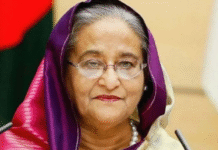Jamaat-e-Islami Secretary General Ali Ahsan Mohammad Mujaheed took a brief pause before rejecting the death sentence awarded to him seconds ago on Wednesday.
“This is a gross injustice,” a defiant-looking Mujaheed said while standing up in the dock after the verdict.
“It has been given because of my Islamic movement,” said the man who once denied the existence of war criminals in Bangladesh and said there were no anti-independence elements either.
As policemen were taking him away, the convicted war criminal, thrusting his right forefinger into the air, said, “The Islamic movement will continue.”
Then he bade farewell to BNP leader Salauddin Qader Chowdhury while leaving the tribunal premises. The two had also met earlier in the morning at the tribunal’s lockup and chatted for nearly one hour.
Mujaheed then shook hands with the policemen there. He said goodbye to his son Ali Ahsan Mabrur who was with him.
With a sad look on his face, he seemed to be beside himself with frustration and anger. “Only Allah is the controller of life and death,” he said.
Earlier, right after te judgement, his son Mabrur had said, “My father is a victim of injustice. We are upset because he has been punished on the basis of some impressions and not on hard evidence.”

The top Al-Badr commander will be “hanged by the neck” for unleashing his pro-Pakistan militia on unarmed intellectuals including a top journalist to crush the struggle for freedom in 1971.
The second war crimes tribunal of Bangladesh awarded death for mass murders the 66-year-old had planned and executed during the Liberation War.
While delivering the verdict, the presiding ICT-2 judge – Justice Obaidul Hassan – had described Mujaheed as an “atrocious Al-Badr” commander who conspired, abducted, tortured and murdered.
Later, Justice Shahinur Islam read out the 37-page executive summary of the 209-page verdict in presence of Mujaheed in a courtroom packed with lawyers, journalists and observers.
However, the chief defence counsel Abdur Razzaq said they would contest the verdict because the tribunal failed to assess the evidence properly.
“With due respect to the tribunal, this is a wrong verdict,” said chief defence counsel Abdur Razzaq. “They have failed to evaluate the customary law in this regard.”
Of the seven charges brought against the Jamaat Secretary General, the tribunal found Mujaheed guilty of five.
Mujaheed was found “guilty of extermination of intellectuals” and involvement in the murder and torture of Hindus, for which he was given death sentence.
He also got death for the first charge – abduction and murder of journalist Sirajuddin Hossain, then executive editor of Daily Ittefaq in 1971.
The first charge was “merged” with the sixth charge — conspiracy and extermination of intellectuals; the death penalty came for these two.
The tribunal said Mujaheed would go to the gallows for the seventh charge – murder and torture of Hindus – proven beyond any reasonable doubt.
He got life sentence for his role in the abduction torture and murder (charge 5) of composer Altaf Mahmud, well-known freedom fighters Shafi Imam Rumi, Badiuzzaman, Magfar Ahmed Chowdhury Azad, Abdul Halim Chowdhury Jewel and Jahir Uddin Jalal (who managed to flee).
Charges of genocide (charge 2) and abduction and torture in another instance (charge 4) were not proven beyond reasonable doubt.
For the third charge – another abduction and torture – he was given five years in jail.
Source: Bd news24









